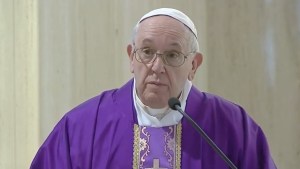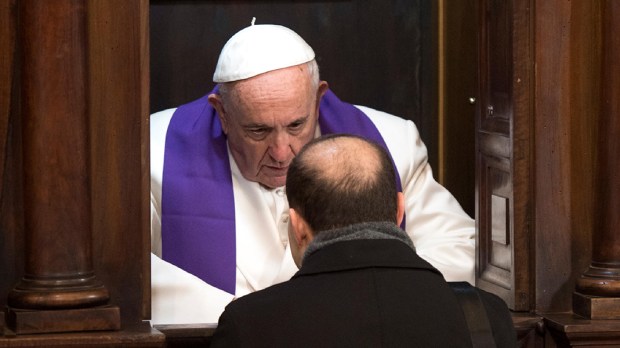Pope Francis once focused a homily on the need to recognize ourselves as sinners, with the simplicity of children, acknowledging the concrete sins that we commit.
The First Letter of St. John, he noted, presents many contrasts: light and dark, lies and truth, etc. We cannot have communion with Christ while walking in darkness. “One thing or the other,” he said.
Gray is even worse, because gray makes you think that you’re walking in the light, since you’re not in darkness, and this calms you. Gray betrays you. One thing or the other.
The Holy Father stressed John’s assertion that “if we say we are without sin, we deceive ourselves.” Here, he warned,
there is something that deceives us: to say ‘we’re all sinners,’ like saying ‘good morning’ or ‘have a nice day’ — a habit, even a social [norm], and with this, we don’t have a real awareness of sin. No. I’m a sinner because of this, this, and this. Concrete.
The Pope said we need to be concrete in Confession, not presenting our falls in some abstract sense: “Yes I lost my patience once, and then I did it gain.” Instead, he suggested we present our sins concretely: “‘I did this. This is what I thought. This is what I said.’ Being concrete is what makes me feel that I am truly a sinner and not a sinner ‘in the air.'”
Pope Francis said that children give a good lesson in this regard, as they confess their sins very concretely. He recounted how he always remembers one child in this regard:
He came to tell me that he was sad because he had fought with his aunt. … I asked him, ‘What did you do?’ ‘Well, I was at home and I wanted to go out to play soccer’ – just a boy – but his aunt – his mom wasn’t there – she told him, ‘No, don’t go outside. First you have to do your chores.’ ‘Then this and that and then I told her to go to this place.'” He was a boy with great geographical knowledge! He even told me the name of the country where he had sent his aunt! Children are like that … simple, concrete.
“We should be simple as well, concrete,” the Pope said. “Being concrete leads you to humility, because humility is concrete. ‘We’re all sinners,’ is something abstract. No. ‘I’m a sinner because of this, this, and this.’ And that gives me shame in looking at Jesus. ‘Forgive me.’ This is the true attitude of a sinner. If we say that we have not sinned, we deceive ourselves and the truth is not within us.”
No spin in the confessional
Francis urged us to be like children “who say what they feel, and what they think: They still haven’t learned the art of saying things with a bit of spin so that it’s understood, but not stated. This is an art that adults have, which oftentimes doesn’t bring anything good.”
Yesterday, I got a letter from a boy from Caravaggio. His name is Andrea. And he told me things about himself: Letters from children, from kids, are beautiful, in their concreteness. And he told me that he had watched Mass on television and that he needed to scold me for something: That I said, ‘Peace be with you,’
[He scolded,] ‘You can’t say that because during the pandemic, we can’t touch each other.’ He couldn’t see that you (in the congregation, make the sign of peace) with your heads, and without touching. But this freedom to say things as they are.
The Holy Father said that we must be like Andrea, willing to tell the Lord about things just as they are. “Lord, I’m in sin. Help me.” …
“Because the devil wants us to live lukewarm, tepid, in the gray: neither good nor bad, neither black nor white: Gray. … If we confess our sins, He is faithful and just to pardon us: He pardons us when we are concrete. The spiritual life is so simple, so straightforward, but we complicate it with our nuances, and at the end, we never arrive …”
Let us ask the Lord for the grace of simplicity, that he give us this grace that he gives to simple people, to children, to youth who say what they feel, who do not hide what they feel. Even if it’s something incorrect, but they say it. Also with Him: to say things: transparency. And not to live a life that is neither one thing nor the other. The grace of freedom to say things and also the grace to know well who we are before God.

Read more:
Pope addresses what to do since many can’t get to Confession

